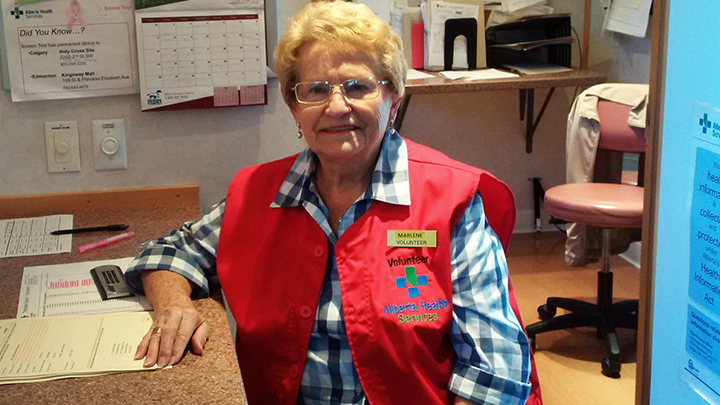
September 21, 2016

Marlene Pieper, a volunteer for Alberta Health Services’ Screen Test mobile mammography service, caught her own breast cancer early thanks to a routine mammogram performed by the program.
Story by Kristin Bernhard and Heather Kipling
DIDSBURY — Marlene Pieper has been volunteering with the Screen Test mobile mammography service here for 15 years.
A year ago, Pieper mentioned to one of the mammography technologists that she forgot to make an appointment for her mammogram. The technologist made a phone call and confirmed an opening was available, allowing Pieper to have a mammogram done while she was volunteering.
This call likely saved Pieper’s life.
“I still do not know what may have happened if not for her and the mobile clinic,” Pieper says.
There was a lump on her right breast and a biopsy confirmed it was cancer. Surgery was performed at Rockyview General Hospital in Calgary the following month and the tumour was successfully removed.
Pieper’s early-detection success story is one of the many such stories attributed to Alberta’s only mobile breast screening program, which has now been in operation for 25 years.
Since 1991, the Screen Test service has completed 454,583 mammograms for 174,395 clients throughout Alberta. Out of those screened, 20,619 (or 4.5 per cent) of clients have had an abnormal result detected, and were recalled to go for further testing. Out of those clients recalled, more than 2,400 were found to have breast cancer.
Screen Test targets women 50 to 74; when women in Alberta turn 50, they receive an invitation letter to undergo a screening mammogram. About 57 per cent of eligible women follow through with the procedure.
“Our mobile screening units are able to reach women who otherwise may not get a screening mammogram,” says Dr Huiming Yang, Provincial Medical Officer of Health, Healthy Living and Medical Director, Screening Population, Public and Indigenous Health, Alberta Health Services.
“We can bring services to unique populations including rural and remote communities as well.”
In the past, if a woman underwent a mammogram, it was usually after she had discovered a lump or experienced other breast symptoms.
“Early detection is so important. The chance of dying from breast cancer is reduced by 30 per cent.”
It’s recommended that women in the target age range have a screening mammogram at least every two years, and women in the 40- to 49-year age group who choose to be screened have a mammogram each year.
Pieper has just completed her cancer treatments and continues to volunteer with five AHS programs including the Screen Test mammography clinics.
For more information on the program, including eligibility and referrals, visit screeningforlife.ca/breast.